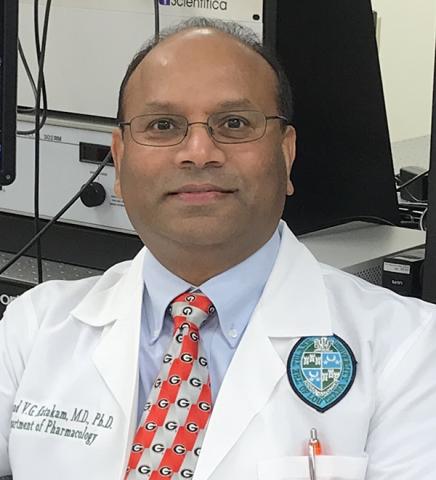Prasad VG Katakam, MD PhD
Professor
School of Medicine
Pharmacology
Diabetes Research
Debakey
TIPS Mentor

Areas of Expertise
Cerebral microcirculation
Stroke Diabetes Aging
Alzheimer’s disease
Cerebrovascular insulin resistance
Nitric Oxide Synthases
Biography
Academic Training
- Bachelor of Medicine and Bachelor of Surgery (M.B.,B.S): Andhra University, Visakhapatnam, India (1989).
- Master of Science (MS) in Pharmacology: University of Georgia, Athens, Georgia (1995).
- MD: Education Commission for Foreign Medical Graduates (ECFMG), Philadelphia, Pennsylvania (1995).
- Clinical Fellowship in Cardiac Rehabilitation: West Roxbury VA Medical Center, Affiliate of Harvard Medical School (1996).
- Doctor of Philosophy (Ph.D) in Pharmacology: University of Georgia, Athens, Georgia (1999).
- Postdoctoral Fellowship: Department of Internal Medicine, University of Iowa College of Medicine, Iowa City, Iowa (1999-2001).
- Research Associate in Electrophysiology: Cardiovascular Sciences, Mayo Clinic, Rochester, Minnesota (2001-2003).
- Postdoctoral Fellowship: Department of Physiology and Pharmacology, Wake Forest University School of Medicine, Winston-Salem, North Carolina (2003-2009)
Faculty Appointments
- Instructor: Department of Physiology and Pharmacology, Wake Forest University School of Medicine, Winston-Salem, North Carolina (2010-2011).
- Assistant Professor: Department of Pharmacology, Tulane University School of Medicine, New Orleans, Louisiana (2011-2017).
- Associate Professor (Tenured): Department of Pharmacology, Tulane University School of Medicine, New Orleans, Louisiana (2017-2022).
- Associate Professor (Adjunct): Clinical Neuroscience Research Center, Tulane University School of Medicine, New Orleans, Louisiana (2019-present).
- Professor (Tenured): Department of Pharmacology, Tulane University School of Medicine, New Orleans, Louisiana (2023-Present).
Interests
- Insulin Resistance: The major focus of our research is to study the mechanisms of cerebrovascular dysfunction underlying insulin resistance, a condition that precedes the development of diabetes.
- Our laboratory studies cerebral, coronary, and mesenteric arteries. Our current focus is on the regulation of cerebral microcirculation by mitochondria, bioenergetics, and free radicals. We make use of endothelial cells and neurons from primary cultures as well as isolated mitochondrial preparations from brain.
- We are also investigating the role nitric oxide synthase isoforms in regulating the brain microvascular function and Blood Brain Barrier (BBB) integrity in health and under conditions such as stroke, aging, diabetes, Alzheimer’s disease.
- The techniques we employ include isolated artery (ex vivo) preparations often combined with laser confocal microscopy. In addition, our group studies cerebral microvascular responses including neurovascular coupling utilizing two photon excitation microscopy.
- Cellular Bioenergetics: Our studies utilize Seahorse Extracellular Flux Analyzer for measuring bioenergetics and mitochondrial function of endothelial cells, neurons, isolated mitochondria, and cerebral microvessels.
- Free Radical Biology: We examine the role of reactive oxygen and nitrogen species in microvascular signaling by utilizing electron spin resonance spectroscopy (Bruker Biospin e-scan).
